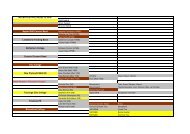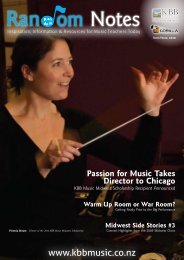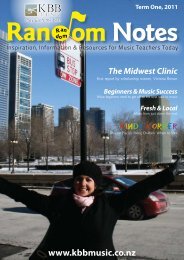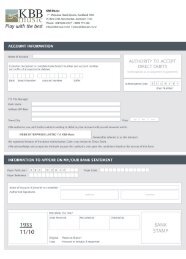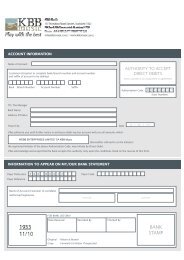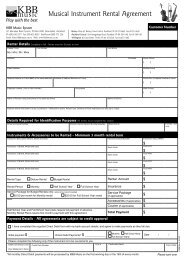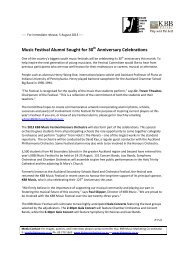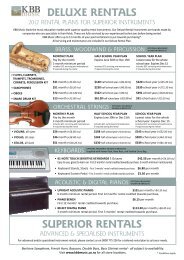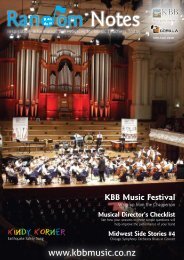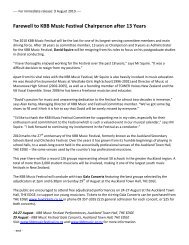choral briefs midwest clinic performance anxiety - KBB Music
choral briefs midwest clinic performance anxiety - KBB Music
choral briefs midwest clinic performance anxiety - KBB Music
You also want an ePaper? Increase the reach of your titles
YUMPU automatically turns print PDFs into web optimized ePapers that Google loves.
Dealing with<br />
Performance<br />
Anxiety<br />
By Trevor Thwaites<br />
As the <strong>KBB</strong> <strong>Music</strong> Festival approaches we get more excited<br />
about the <strong>performance</strong>s we might be giving or hearing. Often<br />
this excitement can get channelled in the wrong direction<br />
and suddenly morph into panic or nervous tensions. How we<br />
deal with pre-<strong>performance</strong> <strong>anxiety</strong> is a critical factor in the<br />
production of a successful <strong>performance</strong>.<br />
For me, knowing the music inside and out is important. As<br />
a percussionist, if I’m working with orchestral or big band<br />
scores, then analysing these and addressing any tricky bits is<br />
critical. If I’m playing music learned aurally from recordings,<br />
then I steep myself in the style of the music or a performer’s<br />
catalogue of recordings in the weeks or days beforehand,<br />
until I feel part of the genre. Where I might have tricky mallet<br />
parts in an orchestral or similar score, I mentally practice the<br />
stickings and the leaps etc, often several times a day. For very<br />
complex sections, I try to find the main harmonic guide tones<br />
that run through the specific section, so that if I do came adrift<br />
I can soon regain my place, and composure, through aurally<br />
recognising where I am.<br />
If playing drums in a jazz situation, knowing the tunes (heads)<br />
is very important, especially if I’m the one counting in. In these<br />
situations I mentally run through the first set before going on<br />
stage. People don’t make me nervous, not being musically<br />
prepared does.<br />
Warming up can be difficult for percussionists, and even if you<br />
do so immediately beforehand, you may not play anything<br />
technically demanding in an orchestral context for 40 minutes<br />
or more. This means being in a state of physical relaxation<br />
while also being mentally alert so that you play the part<br />
effectively when it comes up. Being tense produces nervous<br />
sounding music. I trust my body and find that before a big<br />
<strong>performance</strong> I often become overwhelmed by a feeling of<br />
absolute exhaustion and find myself wondering how on earth<br />
I’m going to be able to perform effectively in a few hours<br />
time. In learning to trust my body I find that sure enough, in<br />
the thirty minutes or so leading up to the <strong>performance</strong>, my<br />
body kicks in and I’m ready and eager to play. Playing the<br />
music becomes everything for me.<br />
I asked my secondary music teacher education graduate<br />
students how they deal with <strong>performance</strong> <strong>anxiety</strong>. All are<br />
experienced performers and here are some of their responses<br />
categorised under three headings—wellbeing, mental<br />
preparation, physical preparation:<br />
Wellbeing<br />
• Deep breathing before the <strong>performance</strong><br />
• A good sleep the night before, or one in the afternoon<br />
prior to a <strong>performance</strong><br />
• Putting lavender essential oil on a tissue and breathing in is<br />
relaxing<br />
• Tai Chi or movement exercises<br />
• A small squirt of Arnica liquid on my tongue seems to calm<br />
me down. I know musicians who use other herbal aids such<br />
as Rescue Me<br />
• Don’t eat too much before a <strong>performance</strong><br />
• A small amount of physical activity to activate the body, I<br />
then do warm-up exercises and mentally run through the<br />
whole <strong>performance</strong>. I follow this process every time<br />
• An intake of ‘carbo food’, such as a banana, 90 minutes<br />
before a <strong>performance</strong><br />
Mental preparation<br />
• Being well-prepared and run through the various stages of<br />
the <strong>performance</strong> mentally, including the coming on and off<br />
the stage<br />
• I run through the tricky parts in my head, with the<br />
music in front of me but no instrument<br />
• I think to myself that no one will notice my mistakes<br />
in that they are less important than the total<br />
ensemble <strong>performance</strong><br />
• Confidence creates a confident <strong>performance</strong><br />
• I tell myself not to worry, getting nervous/anxious is<br />
normal for performers<br />
• I like to find a quiet place, perhaps in the green or<br />
warm-up room, and look over the music<br />
• I try to put worrying about the <strong>performance</strong> as<br />
something to do after the <strong>performance</strong> is over –<br />
reflecting on how to improve for next time<br />
• I try not to worry or focus upon the expectations of<br />
others (fellow performers or audience) and simply<br />
try to meet my own expectations<br />
• As a singer I like to focus on the character or story<br />
of the lyrics<br />
8 Random Notes <strong>Music</strong>al Instrument Specialists since 1888



